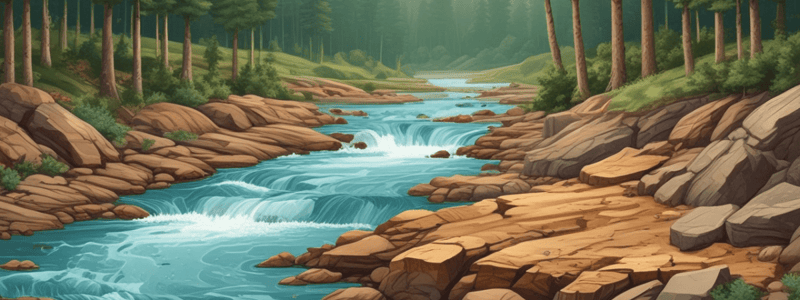Podcast
Questions and Answers
What are the two main categories of sources of water?
What are the two main categories of sources of water?
- Groundwater and surface water (correct)
- River water and lake water
- Rainwater and seawater
- Surface water and ocean water
What is an aquifer?
What is an aquifer?
- An underground water reservoir made of permeable rock (correct)
- A type of irrigation system
- A man-made reservoir
- A type of surface water
Why is aquifer depletion a problem?
Why is aquifer depletion a problem?
- Because it is expensive to pump water from aquifers
- Because it causes flooding
- Because it takes a long time to recharge (correct)
- Because it is a natural process
What can be a result of land subsidence?
What can be a result of land subsidence?
What is the main use of groundwater from aquifers?
What is the main use of groundwater from aquifers?
What is a characteristic of surface waters?
What is a characteristic of surface waters?
Why is it important to consider our daily water use?
Why is it important to consider our daily water use?
What is responsible for the Leaning Tower of Pisa?
What is responsible for the Leaning Tower of Pisa?
What happens when surface waters are overdrawn?
What happens when surface waters are overdrawn?
What is the result of massive withdrawal of water from the Aral Sea?
What is the result of massive withdrawal of water from the Aral Sea?
Why do plants and animals in surface waters and surrounding areas struggle when water supplies change?
Why do plants and animals in surface waters and surrounding areas struggle when water supplies change?
What happens to the salts in irrigation water?
What happens to the salts in irrigation water?
What is the result of excess salts in the soil?
What is the result of excess salts in the soil?
What can happen to salty soils?
What can happen to salty soils?
Why is irrigation a problem for both aquifers and surface waters?
Why is irrigation a problem for both aquifers and surface waters?
Flashcards are hidden until you start studying
Study Notes
Sources of Water
- Water is used for various purposes such as cleaning, drinking, agricultural irrigation, and generating electricity from hydroelectric power.
- There are two main categories of water sources: groundwater (below the surface of the ground) and surface water (above ground).
- Groundwater can be found just below the soil or in an aquifer, which is an underground water reservoir made of permeable rock.
- Aquifers are like large spongy areas that can hold water for many years, but they do not fill quickly and can take a long time to recharge.
Removal of Groundwater
- Aquifers are found all over Earth, and the water in them is removed through wells.
- The water from aquifers is an important supply for agricultural irrigation, drinking water, municipalities, and commercial and industrial uses.
- Aquifer depletion occurs when more water is pumped from the aquifer than is allowed to recharge, causing serious problems in the landscape.
- When too much groundwater is pumped from the aquifer, the land may subside, creating sinkholes and other issues.
- Other issues that may arise from aquifer depletion include less water reaching streams, rivers, and lakes, dried-up wells, a lowered water table, and saltwater entering the groundwater supply.
Removal of Surface Water
- Surface waters, such as streams, lakes, and rivers, provide a necessary source of drinking water, crop irrigation, and energy.
- Just like aquifers, surface waters can also be overdrawn, leading to issues such as the Colorado River no longer reaching the Gulf of California.
- The Aral Sea in Central Asia is an extreme example of overdrawing surface water, resulting in a drastic decrease in volume over 40 years.
- Overdrawing surface water affects not only humans but also the ecosystems these aquatic areas support, leading to habitat loss and extinction of species.
Irrigation Makes Soil Salty
- Irrigation removes large amounts of water from both below and above ground, adding dissolved salts back into the soils, leading to salinization.
- The water used for irrigation isn't very salty, but the concentration of salts increases as the water evaporates, leaving salts behind on the ground.
- The application of fertilizers to crops adds even more salt to the soil, exacerbating the problem.
- Salinized soils prevent plants from taking up water, affecting native plants, agricultural crops, and the ecosystem overall.
- Excess salt may also run off into surface waters or leach into groundwater supplies, causing salinization and contamination.
Studying That Suits You
Use AI to generate personalized quizzes and flashcards to suit your learning preferences.




